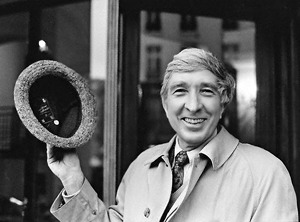 I saw the thinly disguised remembrance of Updike’s mother in The Sandstone Farmhouse.
I saw the thinly disguised remembrance of Updike’s mother in The Sandstone Farmhouse.
It appeared in The New Yorker shortly before my own mother died so suddenly. I wrote to him to offer my condolences and he wrote me right back, the nicest letter.
I always said I would go and find the story and offer a bit of it here, maybe on some quiet summer day.
It looks to me as though this is finally the day.
It’s just this passage partway through the tale.
His writing inspires me as much now as it did when I first read Rabbit Run, during Rest Hour the summer I was 13 and lying on my cot at summer camp.
Relatives and neighbors spoke to him with a soft gravity, as if he were fragile in grief. He knew he and his mother were regarded as having been unusually, perhaps unnaturally, close, whereas between themselves the fear was that they were not close enough. Why grieve? She was old and in pain, worn out, She was too frail in her last half-year to walk to the mailbox or lift a case of cat food or pull a clump of burdock. It was time; dying is the last favor we do for the world, the last tax we pay.
He cried only once, during the funeral, quite unexpectedly, having taken his seat at the head of his raggedly extended family, suddenly free for the moment, of arrangements and decisions. An arm’s reach away from him gleamed the cherry-wood casket he had picked put at the undertaker’s three days before. The lustrous well-joined wood, soon to be buried – the sumptuous waste of it. She was in there and in his mind there appeared a mother conceived out of his earliest memories, a young slim woman dressed in a navy-blue suit, with white at her throat, dressed to go off to her job at the downtown department store, hurrying to catch the trolley car. She had once reminisced, “Oh how you’d run, and if you missed it, there wouldn’t be another for twenty minutes and you wanted to cry.” She had laughed, remembering.
His tears kept coming, in a kind of triumph, a breakthrough, a torrent of empathy and pity for that lost young woman running past the Pennsylvania row houses, under the buttonwood trees, running to catch the trolley, the world of the 30s shabby and solid around her, the porches, the blue midsummer hydrangeas, this tiny well-dressed figure in her diminishing pocket of time, her future unknown, her death, her farm, far from her mind. This was the mother, apparently, that he had loved, the young woman living with him and others in a brick semi-detached house, a woman of the world, youthfully finding her way. During the war she worked in a parachute factory, wearing a bandanna on her head like the other women, plump like them by this time, merging with them and their chatter one lunch break when, he, somehow, had bicycled to the side entrance to see her. She was not like them, the tough other women, he knew, but for the moment had blended with them, did a job alongside them, and this too renewed his tears, his native pride in her then, when he was 10 or 11. She had tried to be a person, she had lived. There was something amazing, something immortal to him in the image of her running.
He remembered, from their first years on the farm, a crisis with the roof; it was being reshingled by a team of Amishmen and they had left it partially open to the weather on the night of the thunderstorm. Crashes, flashes. Joey’s parents and grandparents were all awake, and he, boy though he still was, was expected to help too; they rushed up and down the attic stairs with buckets, to save the plaster of the walls and ceilings below. There was a tarpaulin in the barn that might help; he found himself outdoors, in the downpour, and he had retained an image of running across the lawn in a flash of lightning that caught the white of her bare legs. She would not have been much over 40, and was still athletic; perhaps his father was included in this unsteady glimpse; there was a hilarity to it all, a violent health.
Working his way, after her death, through all the accumulated souvenirs of her life, Joey was fascinated by the college yearbooks that preserved girlish image. Group photographs showed his mother as part of the hockey team, hiking club. With a magnifying glass he studied her unsmiling competitive face, with her hair in two balls at her ears and a headband over her bangs. Her face seemed slightly larger than the other girls’, a childlike oval broadest at the brow, its defenses relatively unevolved. As he sat there beside the cherry casket crying, his former wives and adult children stealing nervous peeks at him, the young woman ran for the trolley car, her breath catching, her panting mixed with a sighing laughter at herself, and the image was potent, as fertile, as a classic advertisement, which endlessly taps something deep and needy within us. The image of her running down the street away from him trailed like a comet’s tail the maternal enactments of those misty years when he was a child crayoning with him on the living room floor, sewing him Halloween costumes in the shape of Disney creatures, having him lift what she called the ‘skirts’ of the bushes while she pushed the old reel mower under them – but from her point of view; he seemed to feel from within his mother’s head the situation, herself and this small son, this defenseless gurgling hatched creature, and the tentative motions of her mind and instincts as she, as new to the mothering as he was to being alive, explored the terrain between them. In the attic he had found a padded baby blue scrapbook, conscientiously maintained, containing his first words, the date of his first crawl, and his hospital birth certificate imprinted with his inky day-old feet. The baths. The cod liver oil. The calls to the doctor, the subscriptions to children’s magazine, the sweaters she knit. Trying to do the right thing, the normal thing, running toward her farm, her death. In his vision of her running she was bright and quick and small, like an animal caught in a gunsight.
This was the mother he had loved, the mother before they moved, before she betrayed him with the farm and its sandstone house….
There is more of course but I will stop there. The mother in the story, like his own real mother, dropped dead in the kitchen of that sandstone farmhouse, lying there for a day or two before neighbors discovered her.
About ten years ago I flew to see my friend Bobbie in Swarthmore. One day during my visit, she and I drove to the tiny village of Plowville to look for this sandstone house as well as the one ‘in town’ in the larger township of Shillington with its storefronts and trolley tracks. When we walked into the to Town Hall there to ask the address, a man who knew him happened to overhear us and told us so many details about him, mostly about his loyalty to the town and his perennial graciousness.
Four and a half years gone now but doesn’t he still live and move in my mind~ !
